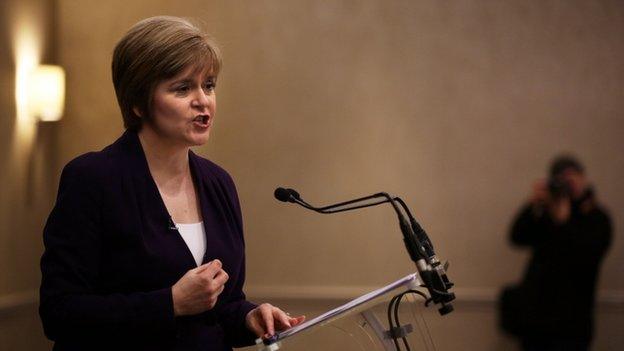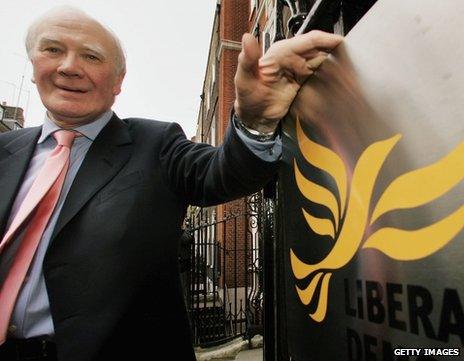Scottish independence referendum: All, or something?
- Published

Nicola Sturgeon delivered her address to the Scottish Council for Development and Industry (SCDI)
It is emphatically not the case that the focus will shift entirely away from the independence offer. But, equally, it is important that the alternative proposals for Scotland's future receive a fair deal of attention - and scrutiny.
Nicola Sturgeon decided to retaliate first - by suggesting that her opponents' ideas, both extant and emerging, fall short of Scotland's requirements.
She outlined five fundamental challenges facing Scotland....
Boosting the economy in a sustainable fashion.
Boosting the population.
Defending public services.
Protecting pensions and benefits.
And enhancing equality of opportunity for the young.
Measured against these, said Ms Sturgeon, her opponents' plans would fail. Only the full power of independence, she argued, would do the job.
Now Ms Sturgeon's opponents see this speech as a form of Trotskyite Impossibilism, the customary caricature of certain positions on the Left. That being - set out a series of demands you know your opponents/the establishment/the state cannot meet; wait for them to fail; blame them for failure.
Anas Sarwar of Labour and Better Together said it was scarcely a surprise that Ms Sturgeon disliked devolution. She preferred "separation".
Now, of course, Nicola Sturgeon is preparing a gin trap for her rivals. Welcome to politics. However, there is more to her speech than that. It is more nuanced, more detailed. She argues, for example, that it is only by gaining full control of such matters as immigration that Scotland can grow her population and build the economy.
Facing a quandary
No, say her opponents, such an endeavour is possible by continuing to share sovereignty (and responsibility for issues like overall welfare provision) with the remainder of the UK.
Still, there is a quandary now facing the Liberal Democrats, the Conservatives and, perhaps especially, the Labour Party.

Menzies Campbell has outlined the Lib Dems' federal approach
They feel constrained - mostly - to enhance the offer in order to counter independence, to head it off. I say "mostly" because there are individuals, particularly in the Tories and Labour, who feel that devolution has gone far enough, thank you very much.
But, mostly, they feel constrained. So next week Ming Campbell will update the Lib Dem offer. A fortnight later, Labour's Commission will present a report to the party's conference. In May, the Tories will receive the outcome of deliberations by Lord Strathclyde and his team.
The Lib Dems want substantial tax powers for Scotland as part of a federal UK. They are the most enthusiastic for a single pro-Union offer to emerge - and will set out ideas as to how to achieve that.
Do I expect that to happen? I do not. Too little time, too little uniform agreement - plus the impetus that is the UK General Election which is pushing parties the other way, towards competing offers to the electorate.
Rather, as these meanderings have suggested previously, stand by for a form of Venn Diagram, with overlapping areas.
At which point, stand by for Ms Sturgeon to argue that there is uncertainty intrinsic in the Unionist case: that people in Scotland cannot be certain what a No vote in the referendum means.
Tax powers
And, further, what of the areas of overlap? Labour will offer further devolution of tax powers - beyond the plans already in the pipeline from the Scotland Act 2012, external. Plus they will suggest devolving some aspects of welfare and employment policy.
All income tax? Probably not. All welfare. Certainly not. A balance will be struck, with nothing done which disturbs the overall and developing balance of powers in these islands. Developing with, for example, the latest ideas from the Silk commission in Wales today.
Expect the Tories to set out further tax powers: the logic being (this site ad nauseam) that it is only with a large fiscal canvas that the Tories can credibly paint a picture of tax cuts. Expect them also to make Strathclyde part of a wider search for a stable UK constitutional framework - again with nothing to disturb the Union.
For supporters of the Union, it is entirely logical to strike a balance, to enhance devolution within the ambit of the UK. For supporters of independence, that aim is precisely the problem. Your referendum, your choice.